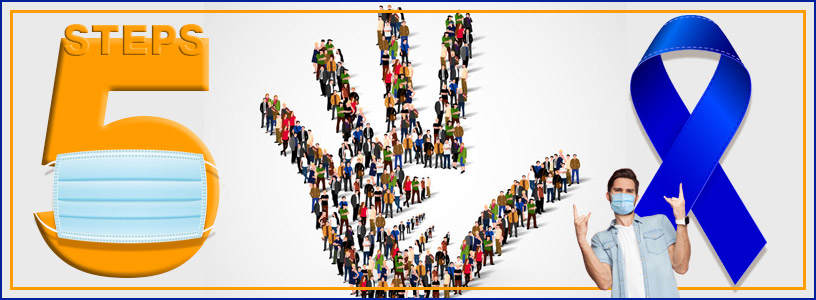KEEP MASKING UP For Everyone's Safety
Pick a mask with layers and make sure it fits snugly against your face to keep your respiratory droplets in and others’ out. Even after you get vaccinated, continue to wear a mask, because the vaccine may not prevent you from spreading the virus, even if you don’t get sick yourself. Helpful links:
- CDC: Improve How Your Mask Protects You
- Oregon residents: COVID-19 Vaccine in Oregon
- Washington residents: COVID-19 Vaccine in Washington
- Health Trust website: COVID-19 and Your Benefits
GET SCREENED: March is National Colorectal Cancer Awareness Month
Colorectal cancer is the second leading cancer killer in the U.S., but it doesn’t have to be. Screening tests can find precancerous polyps and remove them before they turn into cancer. If you are 50 to 75 years old, you should get screened for colorectal cancer (earlier, if you have an increased risk).
Millions of people in the U.S. have put off getting screened in the past year. They are missing the chance to prevent colorectal cancer or find it early when treatment often leads to a cure. If you’ve been putting it off, now is the time to make an appointment to get screened.
And remember, there is no cost to you: Your Health Plan covers recommended preventive screenings at 100%.
There are several screening methods, even some that you can do at home. They include stool tests, flexible sigmoidoscopy, colonoscopy, and CT colonography (virtual colonoscopy). Ask your doctor which is the best method for you.
Here’s how your Health Plan helps you:
- Kaiser Permanente: Which Screening Test Should I Have?
- Providence: Colorectal Cancer Screening and Risk Reduction
- Regence: Chronic conditions associated with colon cancer on the rise, especially among millennials
- See our video: Simple Screenings Could Save Your Life
NEW VIDEO: Five Steps to Get Health Care Safely
The pandemic has shown us how quickly disease can spread and that we need to take safety precautions when we are sick or near others who may be sick.
“Going to the doctor” in 2021 has a new meaning than it did one year ago. You can have a doctor visit by video chat, by phone, or in person. That means you can safely get health care without spreading your germs to others or picking up someone else’s illness.
Watch our new video to learn the five steps you can take to make safe health care decisions for you and your family.
- Access Health Care Safely
- Know your Health Plan’s care options: Virtual Care Infographic
YOUR HEALTH PLAN HELPS When You Need It Most
Dealing with catastrophic health issues, such as a life-threating illness or injury or a death, is unfamiliar territory for most of us when it occurs. That’s why the Trust steps in to help with services and benefits like these:
- Case Management: Coordinating care received from several providers.
- Palliative Care: Pain relief for people with serious illnesses.
- Hospice Care: End-of-life care.
- Advance Health Care Directive: Legally protecting your future medical care choices.
- Terminal Illness: Care during an incurable illness that is likely to lead to death.
- Death of a Participant who is covered by Life, Accidental Death and Dismemberment (AD&D) or Long-Term Disability (LTD).
- Grief Support: Healthy ways to cope with grief and learn to heal.
If you or your dependent are facing a catastrophic health issue, we encourage you to:
- Visit the Trust’s website page Life-Threating Illness, Injury and Death for more information.
- Use the EAP’s confidential counseling benefits (at NO COST to you) to talk to a counselor. A few phone calls or online sessions to discuss coping strategies can make a big difference.
- Talk with your healthcare provider about how the services listed above can assist you or call your Plan’s Customer Service team for more information.


